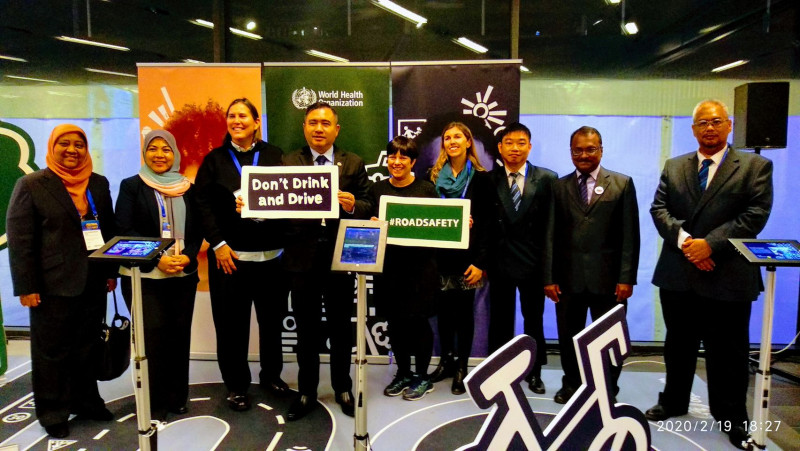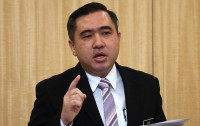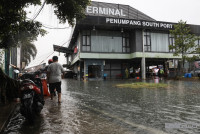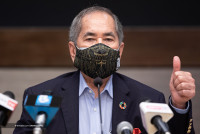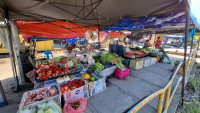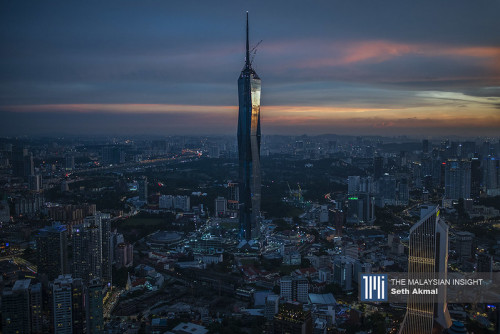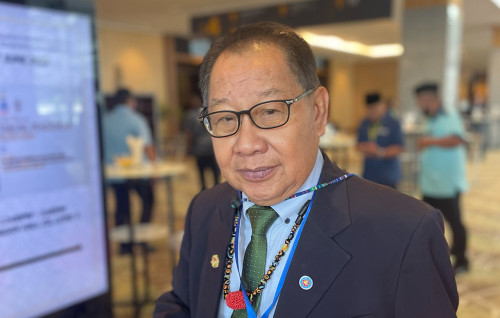THREE years ago last night, Anthony Loke stated something remarkable during an exclusive interview.
“Please don’t view road safety with an elitist mindset,” he had said in the late hour of Stockholm.
Apparently, he was responding to the critics at that point of time during Loke’s first stint as transport minister that he wasn’t doing enough to reduce road crashes involving motorcyclists.
Despite a full-day schedule attending the 3rd Global Ministerial Conference on Road Safety and dinner at the Embassy of Malaysia, he had agreed to meet me at the Radisson Blu Waterfront Hotel lobby, even though our body clock was at 5am Malaysia time.
Back then, the suggestions by pro-road safety groups for the government to impose speed limits specifically for motorcyclists on federal roads and highways and for them to ride only on the left lane had received widespread attention.
It was evident Loke treaded such suggestions cautiously.
“Some of these critics do not realise that it is not easy to get coordination from other ministries and that’s why the approach has to be changed first.”
He was fully aware that motorcycle users accounted for 65.7% of total road user deaths in 2018, the highest percentage ever recorded in the last 18 years.
“What do you want me to do? Do you want me to ban motorcycles on the road?
“I attended one of the parallel sessions (of the conference), and it was stated that banning motorcycles is not an option. Road safety experts are not calling for the banning of motorcycles and I must say as a top priority that we must improve the safety aspect of motorcycle (usage).”
Loke’s commitment and passion for road safety were plain to see. His brother was killed in a motorcycle crash when he was four.
He fully realised that it was largely the government’s obligation to the people to reduce road crashes and fatalities.
“And, of course, being a responsible country to the global community, we fully support the call to reduce road fatalities.
“By 2030 and beyond, we want to halve it and everybody should work on it. And to decide on the way forward, we are trying to work out to push for the agenda to get higher priority from the government.”
It was apparent from his body language at the global conference, he wanted to learn more.
“Our transport minister actively takes notes and he makes it a point to attend several sessions and listens attentively to the experts and panel forum members,” former Malaysian Institute of Road Safety Research director-general Siti Zaharah Ishak had informed me during the dinner with the Malaysian ambassador.
During his first few months as transport minister five years ago, he had impressed the road safety circle with his hands-on approach to life-threatening matters involving technical issues.
Among the things that impressed me was his swift response to the “kopi-o” licence syndicates and the infamous Takata airbag crisis, in which he instructed the Road Transport Department (RTD) to work closely with carmakers to trace car owners for recall exercises.
As one veteran motoring journalist told me, “what he did was unprecedented, not even his predecessors cared to do something about the Takata airbag issue”.
When I contacted Loke in mid-2018 about a series of crashes involving express buses, the 45-year-old Seremban MP told me that he doesn’t like to comment repeatedly and see experts and authorities “talk, talk, talk and talk about it and do nothing”.
Hence, in June 2018, he formed a Recommendations Review Panel to monitor and supervise the execution of the 51 recommendations outlined in the Genting bus crash report made to the public by the Independent Advisory Panel and Transport Ministry seven years before.
The committee had managed to iron out several points regarding the recommendations and execution, but still fell short on a few things until the present time due to a lack of will from various quarters and ministries.
By February 2020, Loke was already at 95% progress to completing the papers to table the law amendment in Parliament on driving under the influence of drugs and alcohol, including increasing the penalties for reckless driving.
However, the one thing that didn’t impress me was when he had allowed excessive tinting for vehicles with the condition that car owners must receive approval for a special permit from RTD with a fee of RM5,000.
It is learned that the move to allow more than 75% tinting for cars with a special RTD permit had made the top brass in Bukit Aman unhappy.
I also expressed my deep concern about dark tinting, knowing that enforcement in the country was rather lacking in many areas pertaining to road rules.
“Yes, I know that you disagree but the enforcement part is something I could work on with RTD,” he told me in May 2019.
The hope before everything crumbles
That night in Stockholm, Loke told me that he was also aware of my critical view of what I considered as half-baked and lethargic efforts by agencies on road safety, especially concerning alarming road casualties involving motorcycle users over the years.
“You talk about special lanes for motorcycles and that is beyond the Transport Ministry’s purview.”
When asked about the proposal by the federal traffic police at the 2019 annual general meeting of the Road Safety Council that the Transport Ministry should introduce a new licensing category for 16- to 20-year-olds to ride only low-powered motorcycles below 70cc, Loke had said that he needed to study the matter first.
“I have to get more details, how practical (is the proposal) and what is the mechanism eventually since it is also about enforcement and how are we going to enforce that?”
Prior to the conference, Loke had visited the Swedish National Road and Transport Research Institute and Volvo headquarters in Gothenburg to learn about their road safety success stories.
His tone was clear and firm about the mission to save lives on the road.
“There are some ideas we can learn from Sweden and the conference. And, of course, we can’t copy lock, stock and barrel.
“For example, Sweden’s Infrastructure Ministry – they are responsible for both transport as well as infrastructure and road construction. They are also involved in road design and construction whereas, for Malaysia, it is divided between two ministries, the Transport Ministry and Works Ministry.”
On the first day of the conference, Loke received the news that Malaysia had been enlisted in the Bloomberg Philanthropies Initiative for Global Road Safety (BIGRS) due to Malaysia’s abysmal record of road casualties in the last 30 years.
Under the multi-partnership BIGRS programme, which will run through 2025, Malaysia is selected with Argentina, Bangladesh, Brazil, China, Colombia, Ecuador, Ethiopia, Ghana, India, Mexico, Philippines, Tanzania, Uganda and Vietnam.
On the second day of the conference, as the then transport minister, Loke had endorsed the Stockholm declaration, in which Malaysia was one of the countries that mandated 18 resolutions on road safety.
“It is a different situation from one country to another, the structure and culture. Nevertheless, we look at how to integrate road safety policies into the government and make it a whole government approach instead of one ministry.
“But we have to see Malaysia’s context, where the government structure differs from many countries. Each country has different conditions, the experts gave their views and suggestions, but we must apply them according to local conditions, and the approach must be applicable to local conditions.
“For Malaysia, we should look at how to integrate the various ministries into achieving the same goal of road safety and this can be done through a different approach.”
He had informed me briefly of his plans and the challenges ahead. It was apparent that Loke wanted to take a fresh approach in several areas and chart something new with the cabinet members upon his return from the global conference.
Three days after my interview with Loke, the cabinet he was in collapsed as a result of Tun Dr Mahathir Mohamad’s resignation as prime minister. Three weeks later, Malaysia was engulfed in a nationwide lockdown due to the Covid-19 pandemic.
Now, Loke gets his second shot to do something about the agenda to save lives on the road.
Time will tell whether he wants to pick up where he left off in Sweden. – The Vibes, February 22, 2023
Shahrim Tamrin is a journalist with The Vibes and has covered the transport beat. He yearns to save lives on the road and has served on the board of the Malaysian Institute of Road Safety Research, whose aim is to foster better road safety interventions.



